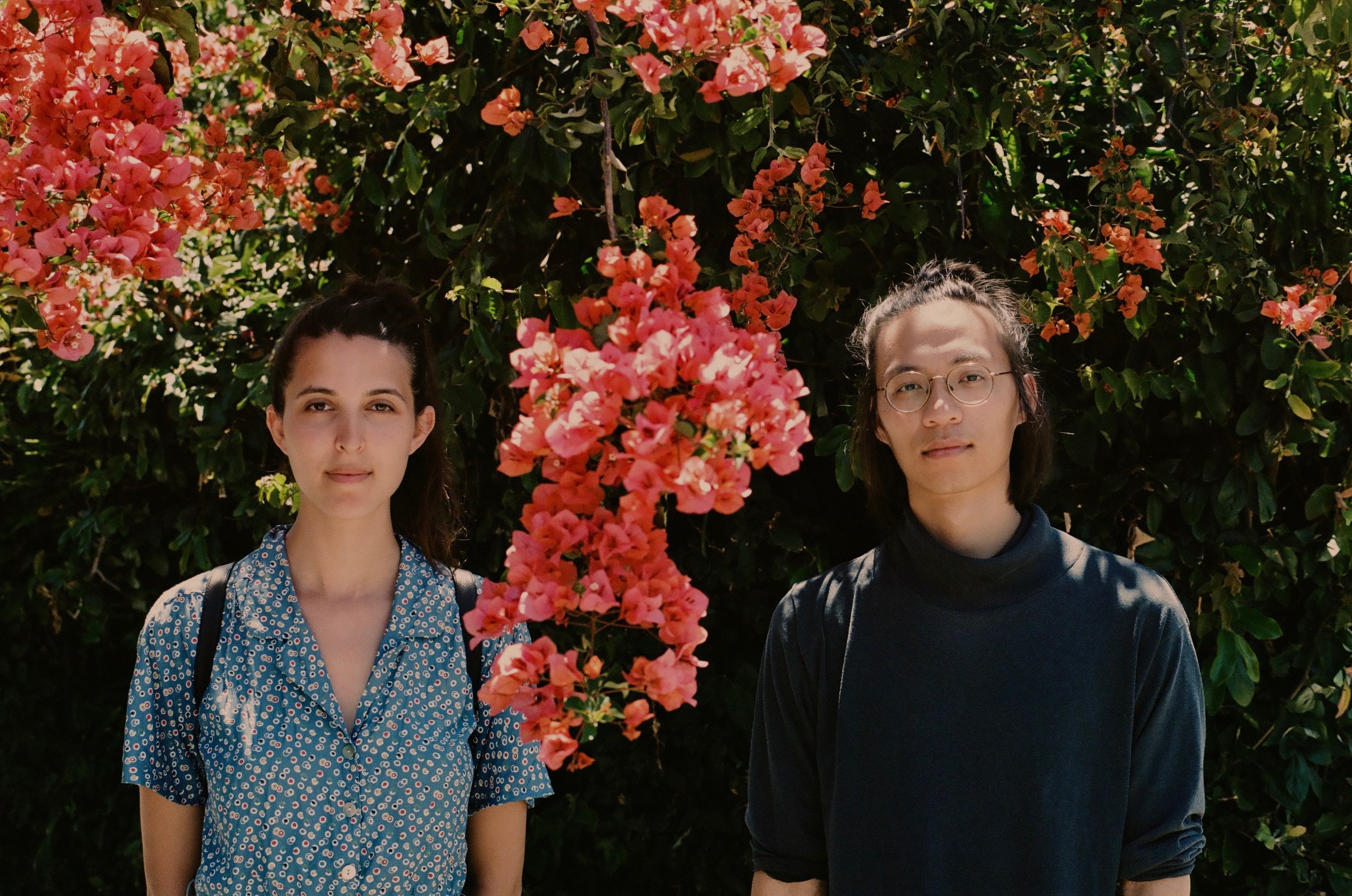Soft Streak
“Late Bloomer” & “Reasonable Lie”
Review + Interview by Alex Free
Soft Streak is an experimental electronic duo based in LA made up of Tori Schachne and Colton Toy.
The 2019 releases of Soft Streak, Late Bloomer + the recent single Reasonable Lie, tell stories of being young and finding your creative voice in Los Angeles— a city full of the constant pressure of media, of living a stylized life, and LA’s strange and beautiful loneliness. But the EP and single, while not forgetting those pressures, find that borderline between doubts and warm late nights, companionship, and the energy of continuous creation and being told that you can be whoever you envision for yourself.
Soft Streak’s sound, full of lush and lightweight beats, create light-blue tracks with pops of synth and bright vocal colors. Tori’s voice is both calm and commanding, the lyrics smart and sensitive. Colton’s production is minimal and observant, giving the songs a texture that fizzes and pops at all the right moments.
The duo, though young in their current iteration, have a strong and confident voice in their ability to blend two tense and opposite ideas: making music that is tender and hesitant, buoyant and sad, vulnerable and sharp, unyielding and fragile.
It’s the balance of being known and the fear of being dismissed before you’ve really had a chance to prove yourself. Of learning to trust yourself and your friends. The progression of self-belief, self-invention, and steadily gaining the confidence to be yourself freely and generously with everyone around you.
Soft Streak have new releases lined-up for the end of summer, and shows scheduled in CA and NY. They’ll continue to subtly change and grow and experiment, making art-house, electro-pop, melodic beat music that’s always an honest picture of the two of them. But for the meantime they’ve given us something to dance to, something to love, and something to look forward to.
interview
Alex Free: So how did you two get this group together? What was the genesis of Soft Streak?
Tori Schachne: We met in college, I guess in sophomore year, and we became friends because we sent each other a lot of music. I listened to a lot of indie rock and more classic stuff in high school, and Colton listened to a lot of hip hop and rap music in high school, and would make a lot of beats.
Colton Toy: Neo-soul.
TS: Yeah, neo-soul. We didn’t really know a lot about the other person’s music tastes, so we would send each other a lot of music, and we thought it was really cool. We were both making music but not with each other, and then we just made a song together.
CT: I think we were both asking ourselves we weren’t we doing stuff with each other.
TS: That was the genesis of the first project. We made stuff for about a year or two, but as we started to make more music we weren’t sure that it fully aligned with what we had been putting out, so we started from scratch and made some Soft Streak music. We put out the first single last May (2018).
AF: How would you say you two have influenced each other, coming from these different music backgrounds?
TS: We definitely were able to open our ears to a lot of new things.
CT: Yeah, I mean for me, I thought I was never going to play guitar. I’ve kind of picked up the guitar in the past few years, and that’s been amazing for our sound, and song-writing in general. I grew up playing the piano—my entire life. It’s kind of nice to write on a different instrument, and I come up with different things that I wouldn’t normally come up with on a piano. So that’s really healthy, to explore different ways to create new sounds.
AF: I feel that we live in a generation where picking up a new thing opens up all these different doors. Especially coming a non-traditional perspective: like your background is in piano, and you pick up guitar, and the liberation of your expression that that gives.
CT: It’s nice to have less tools, sometimes. I know a lot about music but I’m not as great on the guitar, necessarily. That puts a limit on what I can do, but it also provides a different way for me to push myself.
TS: Sometimes the constraints, even if you didn’t place the constraints on yourself, push the limit on what you can do. It makes you more creative, because you have to figure things out in a small box.
AF: Since the first single in May, 2018, how would you say the sound is changing? What’s inspiring you now?
CT: Our music tastes are changing, a little bit.
TS: It is interesting to go back and think about what we were obsessed with three years ago, and two years ago, and even last year and now. It changes a lot. I think it’s okay that the sound changes as long as it stays true to what we are. I think it always has this sort of undercurrent.
CT: The underlying feel is the same, but some of the sonics are a little bit different. But I think that’s how we keep it interesting for ourselves, by always growing and not doing the same music every time we release a song. It’s a little more live-feeling, now, I think. More live drums mixed with program drums, and live guitar.
AF: I was also curious—because your music does really sound like Los Angeles to me—how does your experience living here feed into that music? Outside of going to different shows and being surrounded by different sounds.
TS: I don’t always write from a first person experiential point of view. Sometimes I take the point of view of a character or a friend or someone that I imagine. But it’s definitely all influenced by things that I’ve seen or people that I know. I think being here for the last eight years has a lot to do with that.
CT: I think we really grew up as people here. As adults. And that combined with being around all these people doing art and film and music, all these different influences has really inspired us.
AF: I also feel like there’s a dreamy quality to your music. The life that I’m leading but also the life that I want, and the proximity of those two things, and the ways they’re different. Do you feel like that’s true of your music as well? That there’s a little dreamscape involved.
TS: Before we made music together we thought a lot about the music that we really liked. I feel like there were always these songs in college that I would listen to and feel so deeply. We were talking about how maybe as we get older that happens less often, which is kind of a sad thing, but they always had a sort of dreamy quality. And I think that, without doing it on purpose, we were incorporating that.
CT: I’ve always gravitated toward that sort of production, anyway. So that probably had something to do with it.
AF: Can you elaborate on that—dreamy production?
CT: I think how I started doing production probably influenced it a lot, which is through sampling hip-hop off of records, and I always gravitated towards very atmospheric, spacey stuff with hard drums in it. That’s how I grew up in my production tastes. I think that’s translated. I’m not making hip hop stuff anymore, obviously, but hard drums with atmospheric keyboards has definitely carried over, sound-wise.
AF: So Colton you’re from the Bay Area, and Tori you’re from Connecticut. You said this is the place you became adults together. Do you feel like you can invent, or be who you really are here?
CT: I didn’t know who I was where grew up in the Bay Area. I wasn’t really involved in the music scene, I had never played a show before college. I mean, I played in like jazz band, but that doesn’t really count. So yeah, I feel like I discovered myself here, and became the adult that I am.
TS: Yeah, I mean I also had no idea who I was. I had a lot of existential, panicky moments. I think everyone does. I think also that LA really has this reputation that everyone is really phony, and I’m sure Instagram influencers hasn’t really helped that image, but there are phony people everywhere, and there are good people everywhere, and you have to find your community. It can take a long time.
CT: I feel like we have been surrounded by good people here who really inspire us.
TS: It takes a long time. Sometimes things feel really permanent, and they don’t have to be, whether it’s where you’re living, or the person you want to be. And that’s definitely something I’m not good at remembering. But it’s nice to remember that we can change if we want to do a little work.
AF: Do you see your music as part of that process?
TS: For sure. I feel like a lot of Late Bloomer was about being uncomfortable, and trying to work on the person you want to be, or the situation that you’re in, and getting to it, to that place, even though it’s very awkward or messy.
AF: [laughs] *Identifies.*
CT: I feel like I was going through that as well but we didn’t really talk about it.
TS: We didn’t really go into the process being like ‘let’s write an EP around this stuff,’ but it was just things that we were experiencing, and it sort of all came out at the same time. Sometimes we don’t even talk about the song until it’s done.
AF: It does come across as very authentic, it just seems like a little part of your ongoing California narrative. Maybe all authentic experiences only make sense with hindsight.


